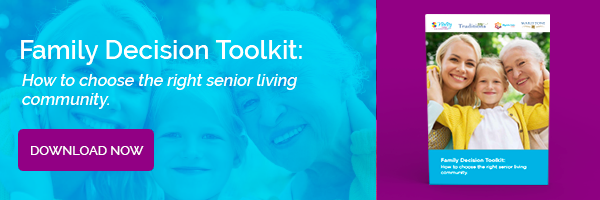We are living longer, healthier lives. This is great news, especially if you have an aging loved one. Living longer and healthier doesn’t mean we won’t need help eventually. According to the U.S. Department of Health and Human Services, 7 of 10 of those 65 and older will need some type of long-term care support. Most likely, that care will come from you or another loved one, as AARP estimates there are about 40 million family caregivers in the United States providing around 37 billion hours of care per year. The question is: how can you best support your aging loved one?
Emotional Support for Your Aging Loved One
Getting older can be scary. Sometimes, the best support you can offer is to listen and empathize. After all, you’ll be in their shoes at some point.
Common fears for older adults include:
- Loss of independence
- Declining health
- Running out of money
- Having to leave home
- Losing loved ones
- Having to depend on others
- Not being able to drive
- Being isolated and lonely
- Falling or becoming incapacitated
By taking these fears to heart and showing empathy, they’ll be comforted that you’re on their side. They’ll feel seen and heard, which strengthens relationships! Be patient and give your loved one as much control over their life as possible by asking how you can help, instead of making decisions for them. Remember, independence is everything.
For more information on supporting your aging loved one, check out our Family Guide to Funding Senior Care & Housing!

Helping Them Thrive
Helping your loved one to stay safe, healthy, connected and supported in their physical and mental needs are key to helping them thrive as they age.
Safety
Be proactive with their safety at home, while driving and with their medications.
Keeping Safe at Home – Nearly a third of older adults fall each year and about half of all falls that require hospitalization take place at home, according to the CDC. But many of those falls can be prevented simply by removing tripping hazards, adding handrails or grab bars and improving lighting. And if your loved one is living alone, make sure they have a 24-hour emergency alert system just in case.
Connection
Driving Safety – According to AAA, weaker muscles, reduced flexibility and limited range of motion can restrict an older adult’s ability to drive. That’s why you should ensure your loved one keeps up with regular health checkups to identify issues early on. It’s also a good idea to consider safe driving refresher courses from AAA or AARP; completion may also result in an auto insurance discount.
Medication Management – According to the Department of Health and Human Services, adverse drug events account for approximately 280,000 hospitalizations annually. With many older adults taking multiple prescriptions, mistakes are easy to make. To reduce the chance for error, help your loved one follow physician instructions and read package inserts, ensuring they take medications for as long as prescribed (even if they feel better). Remember to also stay on top of refills to avoid running out of medicine.
Nutrition
The Alliance on Aging Research has found that senior malnutrition costs the United States $51.3 billion a year, so it’s crucial your loved one continues healthy eating habits. The National Institute on Aging is a great resource for tips on food choices, healthy food shopping on a budget, nutrition requirements for older adults, and even sample menus and shopping lists. If it’s difficult for your loved one to shop and prepare meals each day, consider convenient meal delivery options such as Blue Apron and Hello Fresh.
The AARP Foundation calls social isolation a “growing health epidemic” among older adults and equates the health risks of prolonged isolation to the dangers of smoking 15 cigarettes a day. To keep your loved one connected encourage them to:
- Stay in touch with family and friends in-person, through video chats and/or social media
- Pursue their hobbies and/or volunteer with causes important to them
- Keep learning new skills, a new language, new instrument or even approaching a familiar task in a new way
- Connect spiritually through religion or meditation, art, nature or even positive thinking
Physical and Mental Exercise
The U.S. National Health and Nutrition Examination Survey found that 67 percent of older adults are sedentary for at least 8.5 hours a day. This increases the risk of conditions such as high blood pressure, strokes, cardiovascular disease, some cancers, Type 2 diabetes and even cognitive decline.
To help your loved one reduce their risk, follow the guidelines from the National Institute on Aging: older adults should do at least 150 minutes of moderate-intensity physical activity throughout the week, in sessions of at least 10 minute durations across four categories of exercise — endurance, strength training, balance and flexibility. Find their suggested exercises in these categories here.
As for mental exercises, according to the Alzheimer’s Association someone in the United States develops the disease every 65 seconds. And while a cure hasn’t been found yet, research has shown that the brain does benefit from staying active. There are many ways to exercise your mind, including brain games like chess, bridge, crossword or jigsaw puzzles, as well as reading regularly. Other ideas come with a double bonus. Regular exercise is good for the mind and the body, while staying social and learning something new are as good for the mind as they are in keeping your loved one connected.
Financial Planning for Your Loved One’s Future
Another way to support your loved one is to help them prepare for the future financially. In general, there are three steps you should follow:
- Gather and organize financial documents such as bank and brokerage account information, mortgage papers, insurance policies, monthly bills, pension and other retirement benefits, as well as social security information and stock and bond certificates.
- Then help your loved one put a financial plan in place. Talk with them about their wishes, needs and goals as well as how to handle ongoing financial duties such as bills, benefit claims, investment decisions and tax returns.
- Consider consulting a financial adviser and/or estate planning attorney who specializes in elder care and/or long-term care planning. Discuss insurance options, pension, retirement benefits and personal property that could be potential income. Pinpoint programs in which they may be eligible to offset long-term care costs and potential tax deductions, as well as conducting an investment portfolio analysis with their future needs in mind.
When They Need More Support Than You Can Provide
Most people prefer to age in place at home, and you may already assist your loved one with daily needs such as bathing, dressing, meal prep, housekeeping and errands; perhaps more. But there may come a time when due to chronic illness, disability, stroke or even a general health decline that they need more support than a family caregiver can realistically provide. At this point, it may be time to consider senior living.
Whether it’s assisted living, memory care or skilled nursing, senior living can offer your loved one many benefits:
- An environment that fosters independence — Perhaps even more so than at home, the right amount of support can help them live life to its fullest.
- A worry-free lifestyle — Senior living communities offer restaurant-style dining, housekeeping and laundry services along with spacious accommodations and amenities such as pools and fitness centers.
- Improved quality of life — Abundant opportunities to keep connected and stay mentally and physically fit with monthly calendars filled with clubs, classes, events and outings.
Senior living communities can also offer you one of the most invaluable benefits of all: peace of mind. You’ll know that your loved one is safe, well-cared for and supported, and instead of their caregiver, you get to enjoy being their spouse, daughter or son again.



